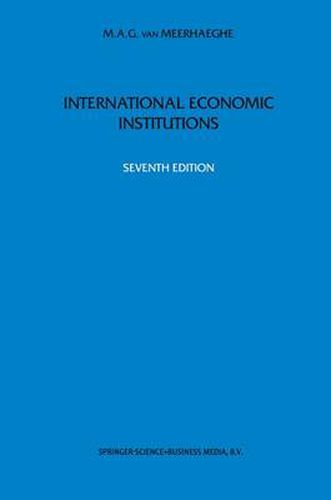Readings Newsletter
Become a Readings Member to make your shopping experience even easier.
Sign in or sign up for free!
You’re not far away from qualifying for FREE standard shipping within Australia
You’ve qualified for FREE standard shipping within Australia
The cart is loading…






This title is printed to order. This book may have been self-published. If so, we cannot guarantee the quality of the content. In the main most books will have gone through the editing process however some may not. We therefore suggest that you be aware of this before ordering this book. If in doubt check either the author or publisher’s details as we are unable to accept any returns unless they are faulty. Please contact us if you have any questions.
The growing influence of the major international economic organizations on members and non-members alike makes it imperative that the rules and functions of these organizations be fully understood. This work meets the need for an up-to-date and concise treatment of significant international economic institutions and agreements. The first part of the book is devoted to world organizations or conventions: the International Monetary Fund, the World Bank Group, the World Trade Organization, the Organization for Economic Cooperation and Development and the United Nations Conference on Trade and Development. The second part covers regional organizations: the early experiments in European integration, the European Community, and the North American Free-Trade Agreement. In this book Professor van Meerhaeghe also provides a critical comment on the activities of these institutions. For example, he casts doubt on the usefulness of several institutions and questions the craving for power of the European Commission. The seventh edition has again been extensively revised and brought up to date. The former long chapter on the Economic Community has been split up into three chapters on customs union, economic union and monetary union respectively. A chapter on NAFTA has been added. Due to their reduced (Benelux, EFTA) or only historical (Comecon) significance, the core only of these former chapters has been kept.
$9.00 standard shipping within Australia
FREE standard shipping within Australia for orders over $100.00
Express & International shipping calculated at checkout
This title is printed to order. This book may have been self-published. If so, we cannot guarantee the quality of the content. In the main most books will have gone through the editing process however some may not. We therefore suggest that you be aware of this before ordering this book. If in doubt check either the author or publisher’s details as we are unable to accept any returns unless they are faulty. Please contact us if you have any questions.
The growing influence of the major international economic organizations on members and non-members alike makes it imperative that the rules and functions of these organizations be fully understood. This work meets the need for an up-to-date and concise treatment of significant international economic institutions and agreements. The first part of the book is devoted to world organizations or conventions: the International Monetary Fund, the World Bank Group, the World Trade Organization, the Organization for Economic Cooperation and Development and the United Nations Conference on Trade and Development. The second part covers regional organizations: the early experiments in European integration, the European Community, and the North American Free-Trade Agreement. In this book Professor van Meerhaeghe also provides a critical comment on the activities of these institutions. For example, he casts doubt on the usefulness of several institutions and questions the craving for power of the European Commission. The seventh edition has again been extensively revised and brought up to date. The former long chapter on the Economic Community has been split up into three chapters on customs union, economic union and monetary union respectively. A chapter on NAFTA has been added. Due to their reduced (Benelux, EFTA) or only historical (Comecon) significance, the core only of these former chapters has been kept.